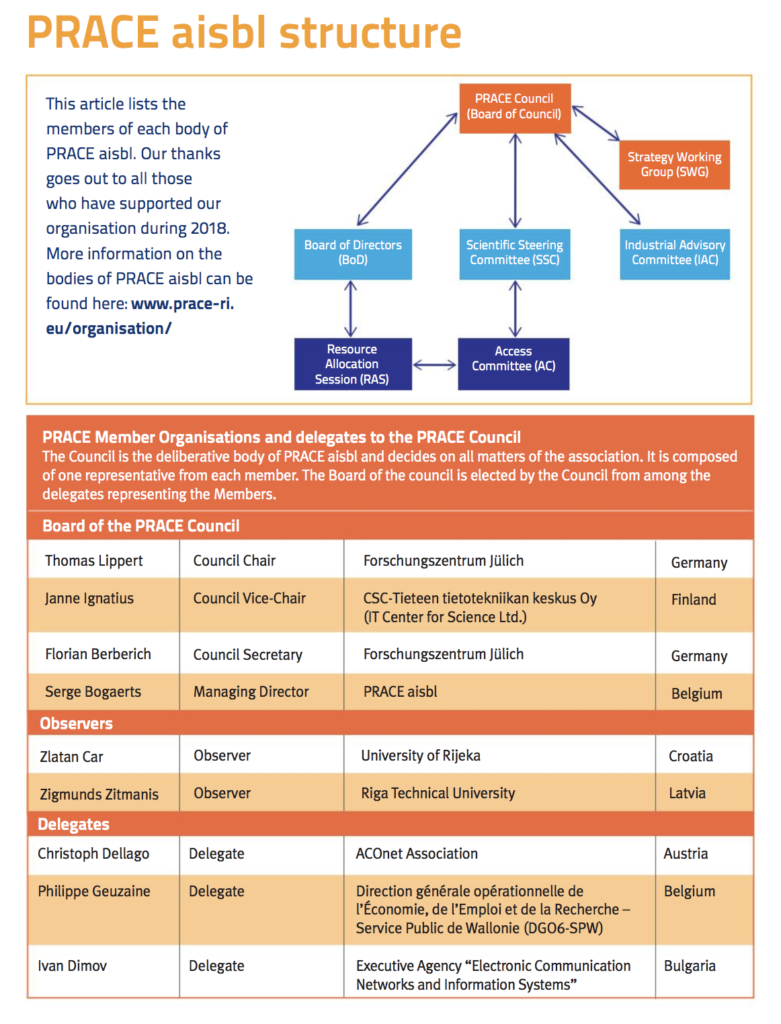PRACE (Partnership for Advanced Computing in Europe) posted its 2018 annual report yesterday and as managing director Serge Bogaerts wrote in his introduction, this year’s edition has a more “corporate publication” feel showcasing people who make up PRACE rather than a compilation of research profiles. That said, there’s still a slew of PRACE performance metrics and profiles of researcher-computer support teams intended to showcase how modern science requires such close collaboration.
Among the highlights are two interesting interviews. One is with Thomas Lippert, chair of PRACE Council and head of the Jülich Supercomputing Centre, who discusses the EuroHPC Joint Undertaking and how it differs from PRACE. A second interview is with U.S. XSEDE project director John Towns who looks at efforts to collaborate (more below on both interviews). Other noteworthy items include discussion of PRACE Scientific Steering Committee’s latest version of the Scientific Case for Computing in Europe 2018-2026, a welcoming of Austria into the PRACE fold, a review of PRACE’s efforts to engage industry, and of course PRACE metrics.
Without question formation of the EuroHPC Joint Undertaking was one of the major new happenings on the European HPC landscape. In his Q&A, Lippert noted, “This represents the recognition of high performance computing and the use of data as important activities at European level and not just at national level. Of course, the European Commission has always supported high performance computing, but this has been based on machines that are supervised at national level. They have now decided that there should, at the very highest level, be a European component to these activities, including the purchase of supercomputers which will be owned by Europe. The EuroHPC Joint Undertaking will act as a funding organization which can make this idea of European supercomputing a reality, both in terms of the operation and purchase of new machines and the development of new technology.
 “In comparison, PRACE is an organization that works with Member States at the national level to act at the European level. It is bottom-up in that it is science-driven, compared to EuroHPC which is more top-down and driven by larger organizations which will control this kind of technology at the highest level. PRACE has, over the years, developed into a powerful organization, controlling how high performance computing is brought to users, how these users are supported, and implementing a stringent peer review process that ensures that there is healthy competition for computing time within academia and industry for the use of the machines it governs.” (For more on EuroHPC, see HPCwire article, Interview: EuroHPC Director Kalbe on Plans to Ramp Up Europe’s HPC Infrastructure.)
“In comparison, PRACE is an organization that works with Member States at the national level to act at the European level. It is bottom-up in that it is science-driven, compared to EuroHPC which is more top-down and driven by larger organizations which will control this kind of technology at the highest level. PRACE has, over the years, developed into a powerful organization, controlling how high performance computing is brought to users, how these users are supported, and implementing a stringent peer review process that ensures that there is healthy competition for computing time within academia and industry for the use of the machines it governs.” (For more on EuroHPC, see HPCwire article, Interview: EuroHPC Director Kalbe on Plans to Ramp Up Europe’s HPC Infrastructure.)
Interestingly, the Towns interview touches upon the often-conflicting desire of scientists to collaborate freely internationally versus government goals to emphasize more narrowly-defined national and regional strength and the delicate efforts of scientific organizations to find productive middle ground. XSEDE (The Extreme Science and Engineering Discovery Environment) is funded by the NSF and charged with providing access to U.S. researchers to advanced computing resources.
Towns noted the U.S. has been pursuing some joint programs with PRACE with the ultimate goal of establishing a mechanism for providing joint allocations of resources in Europe and the U.S. for collaborating research teams. “We started around four years ago with a call for interest to both regions for providing support for these collaborations, which helped us understand how these collaborations work and how we could help to facilitate them. This, along with our developing relationship with RIKEN, eventually led to the signing of a joint memorandum of understanding between the three entities that detailed our willingness to collaborate on various activities,” said Towns.
Asked how he hoped to see the working relationship with PRACE improve in the future, Towns answered, “I think everyone would like to see things move a little faster, but that is the nature of international collaborations. We do not have the frequency of interactions that we have with people from the same region, and so inevitably things can take longer. For both sides, I would say that although we both see working together as really important, it can often be pushed aside as a priority from the perspective of our funding agencies. XSEDE’s funds come from the National Science Foundation in the US, and so the support of researchers in the US takes priority, but they do also recognize that science is increasingly becoming a large team sport, and those teams are almost invariably international.”

“We face various challenges when trying to create stronger ties and closer cooperation between our regions. Although we are similar in many respects, there are differences which can make things difficult. For instance, PRACE is a legal entity whereas XSEDE is a project, so we have different restrictions and freedoms in the way that we operate…Despite these differences, there is a very good collegial relationship between XSEDE and PRACE. It would be easy for us to get tired and give up on trying to work more closely, but there has always a willingness on both sides to recognize the challenges that we face and stand up and find solutions to them together, with the ultimate goal of enabling the best science that we can globally, not just within our regions,” said Towns.
The full PRACE 2018 annual report is a fairly quick read and can be downloaded as a PDF or read online. The annual report will also be available at PRACEdays 19 which will be part of the EuroHPC Summit Week 2019. EHPCSW 2019 will be held from May 13 to 17, Poznan, Poland.
Link to PRACE 2018 Report: http://www.prace-ri.eu/ar-2018/




























































